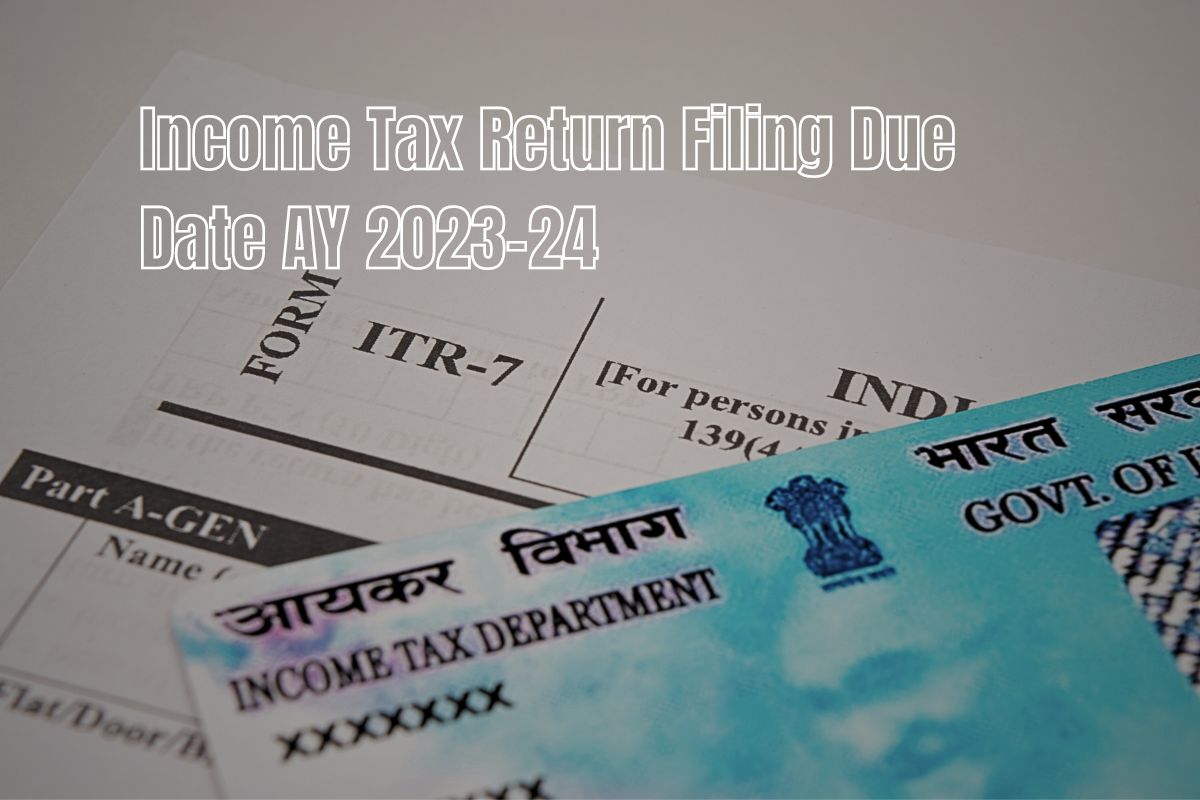Introduction
Filing income tax returns (ITR) is an essential task for every taxpayer. It ensures compliance with a country’s tax laws and allows individuals to report their income, deductions, and tax liabilities. The due date for filing income tax returns for Assessment Year (AY) 2023-24 is a crucial deadline for taxpayers. This article will explore the importance of filing income tax returns, discuss the due date for AY 2023-24, and provide helpful information to help taxpayers meet their obligations effectively.
Understanding Income Tax Return Filing
Income tax return filing refers to submitting a document to the tax authorities that contains details of an individual’s income, deductions, and tax liabilities for a specific assessment year. It is a legal obligation in many countries and aims to ensure that taxpayers accurately fulfill their tax responsibilities.
Significance of Filing Income Tax Returns
Filing income tax returns holds several key benefits for taxpayers. Firstly, it helps in establishing a transparent and accountable system where individuals report their income and pay taxes accordingly. It also facilitates the government in assessing the overall tax liability and implementing policies for the welfare of citizens.
Moreover, filing tax returns on time helps individuals apply for loans, credit cards, or other financial instruments. It serves as proof of income and financial stability, enabling smoother transactions and better financial opportunities.
Due Date for Income Tax Return Filing AY 2023-24
For the Assessment Year 2023-24, the IT due date for filing income tax returns is 31st July 2023. This due date is applicable to individuals, including salaried employees, freelancers, and professionals, whose accounts are not required to be audited.
However, for individuals whose accounts are subject to audit or those who carry out business or profession, the due date for filing income tax returns is 30th September 2023. It is important to note that this due date may vary for certain categories of taxpayers, such as companies, trusts, or partnership firms. Therefore, it is advisable to refer to the official guidelines or consult a tax professional for accurate information.
| Category | Due Date |
|---|---|
| General Individual Taxpayers | July 31, 2023 |
| Individuals with Audit/Profession | September 30, 2023 |
| Tax Audit Report | September 30, 2023 |
| Transfer Pricing Report | November 30, 2023 |
Benefits of Income Tax Return Filing Before the Due Date
Filing income tax returns before the due date offers several advantages. Firstly, it allows taxpayers to avoid the last-minute rush and associated stress. By filing early, individuals can carefully review their financial information, ensure accuracy, and rectify any errors or omissions.
Moreover, early filing provides ample time for individuals to arrange any pending documents or seek professional assistance if required. It also enables taxpayers to plan their finances better, keeping in mind their tax liabilities and potential deductions.
Consequences of Late Filing
Failing to file income tax returns within the specified due date can lead to various consequences. The most significant one is the imposition of a penalty. The penalty amount may vary depending on the taxpayer’s income, duration of delay, and other relevant factors. Additionally, late filing may result in the loss of certain benefits, such as carry-forward of losses or claiming deductions.
Furthermore, late filing could attract the attention of tax authorities, increasing the chances of scrutiny or an audit. This can lead to additional inquiries, penalties, and unnecessary legal complications. Therefore, it is crucial to adhere to the due date and fulfill tax obligations promptly.
Steps to File Income Tax Returns
To file income tax returns for AY 2023-24, taxpayers can follow these steps:
- Collect all necessary documents, such as Form 16, bank statements, investment proofs, and PAN cards.
- Choose the appropriate ITR form based on the nature of income and tax category.
- Fill in the required details, including personal information, income, deductions, and tax liability.
- Verify the information provided and cross-check for accuracy.
- Submit the filled-in form electronically through the official income tax e-filing portal.
- Generate and save the acknowledgment receipt for future reference.
Common Mistakes to Avoid While Filing Returns
While filing income tax returns, it is essential to avoid common mistakes that can lead to discrepancies or delays. Some common errors to watch out for include:
- Incorrect personal details, such as name, address, or PAN card number.
- Miscalculating taxable income or deductions.
- Failing to report all sources of income, including interest, rental income, or capital gains.
- Refrain from including income from freelance work, part-time jobs, or investments.
- Not maintaining proper records and supporting documents for claims made.
Preparing Documents for Income Tax Return Filing
Before filing income tax returns, individuals should gather the necessary documents to ensure a smooth process. Some essential documents include:
- Form 16 or salary certificates from employers.
- Bank statements reflecting interest earned and other transactions.
- Investment proofs, such as mutual fund statements, insurance premium receipts, or property documents.
- Proof of donations made to eligible charitable organizations.
- Any other relevant documents supporting deductions or exemptions claimed.
Exploring Tax Deductions and Benefits
When filing income tax returns, taxpayers should explore various deductions and benefits available to minimize their tax liability. Some common deductions include:
- Section 80C deductions for investments in Provident Fund, Public Provident Fund, or National Savings Certificates.
- Deductions under Section 80D for medical insurance premiums paid.
- Exemptions on house rent allowance (HRA) or house loan interest.
- Deductions for education loans under Section 80E.
- Benefits for senior citizens or individuals with disabilities.
It is advisable to consult a tax professional or refer to the official tax laws to understand the complete list of deductions and benefits applicable to specific situations.
Income Tax Return Filing for Different Categories of Taxpayers
Income tax return filing requirements can vary based on the category of taxpayers. Some common categories include:
- Salaried employees
- Freelancers and self-employed professionals
- Business loan owners and partners
- Companies and corporations
- Trusts and non-profit organizations
Each category may have specific rules, forms, and due dates for income tax return filing. It is crucial to identify the relevant category and comply with the corresponding guidelines.
Filing Income Tax Returns Online
Filing income tax returns online has become more accessible and convenient with the advent of technology. The income tax department provides an e-filing portal where taxpayers can submit their returns electronically. This method eliminates the need for physical paperwork, reduces processing time, and offers quick acknowledgments.
To file returns online, taxpayers need to create an account on the official e-filing portal, fill in the required information, upload relevant documents, and submit the form electronically. It is essential to keep the acknowledgment receipt and any other communication received from the income tax department for future reference.
Seeking Professional Assistance
Filing income tax returns can be a complex process, especially for individuals with multiple sources of income or intricate financial transactions. In such cases, seeking professional assistance from a tax consultant or chartered accountant can be beneficial. These professionals possess the necessary expertise to navigate through the complexities of tax laws, maximize deductions, and ensure accurate filing.
Frequently Asked Questions (FAQs)
Can I file my ITR after the due date?
Yes, you can file your ITR after the due date, but it will attract penalties and may have consequences such as loss of certain benefits or increased scrutiny.
What happens if I need to correct a mistake while filing my returns?
If you make a mistake while filing your returns, you can rectify it by filing a revised return within the specified time limit.
Is it necessary to file ITR if I have no taxable income?
It is optional to file income tax returns if you have no taxable income. However, filing returns voluntarily can be advantageous in the long run.
Can I file my ITR without a PAN card?
No, a PAN card is mandatory for filing income tax returns in most cases. It serves as a unique identifier for taxpayers.
What documents do I need to keep after filing my returns?
After filing your returns, it is important to keep a copy of the acknowledgment receipt, Form 16, and any other supporting documents for future reference or audits.
What happens if I miss the ITR filing due date?
If you miss the due date for filing ITR, you may have to pay a penalty, lose certain benefits, and face increased scrutiny from tax authorities.
Can I file income tax returns for previous years if I missed the deadline?
Yes, you can file income tax returns for previous years if you missed the deadline. However, late filing may incur penalties and additional requirements.
Is it necessary to file ITR if I have only earned income from salary?
Even if you have only earned income from salary and fall within the tax exemption limit, it is advisable to file ITR. It can serve as a record of your income and may be required for various financial transactions.
Can I claim tax deductions for expenses incurred in another country?
Tax deductions are generally applicable to expenses incurred within your own country. However, if you qualify under certain international tax treaties, you may be eligible for deductions based on specific criteria.
Can I file ITR on behalf of a deceased family member?
Yes, you can file ITR on behalf of a deceased family member. You may need to follow specific procedures, provide relevant documents, and consult with a legal professional for guidance.
Conclusion
Filing income tax returns before the due date is crucial for every taxpayer. It ensures compliance with tax laws, provides financial stability, and offers various benefits. For AY 2023-24, the due date for filing income tax returns is 31st July 2023 for most individuals. Filing returns promptly, avoiding common mistakes, and exploring available deductions can help individuals manage their tax liabilities effectively. Remember to seek professional assistance if needed and stay updated with the official guidelines to ensure accurate and timely filing.













